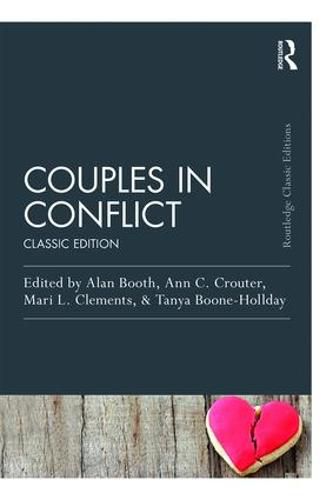Readings Newsletter
Become a Readings Member to make your shopping experience even easier.
Sign in or sign up for free!
You’re not far away from qualifying for FREE standard shipping within Australia
You’ve qualified for FREE standard shipping within Australia
The cart is loading…






This classic volume provides a solid foundation for thinking about creative ways in which our society can work to prevent or minimize destructive couple conflict and enhance couples’ abilities to constructively handle their differences. A common thread throughout is that constructive conflict and negotiation are beneficial for relationships. The new introduction provides an overview of how this classic text is still relevant today.
Divided into four parts, this book:
*addresses the societal and bio-evolutionary underpinnings of couple conflict;
*presents the interpersonal roots of couple conflict and the consequences for individuals and couples;
*discusses what effects couple conflict have on children and how individual differences in children moderate these effects;
*outlines policies and programs that address couple conflict; and
* concludes with an essay that pulls these four themes together and points to new directions for research and program efforts.
This book serves as a supplement in graduate or advanced undergraduate courses on interpersonal relationships, couples and/or family and conflict, divorce, couples and/or family therapy taught in human development and family studies, clinical or counseling psychology, social work, sociology, and communications and it is also a helpful compendium for researchers and clinicians/counselors interested in couple conflict.
$9.00 standard shipping within Australia
FREE standard shipping within Australia for orders over $100.00
Express & International shipping calculated at checkout
Stock availability can be subject to change without notice. We recommend calling the shop or contacting our online team to check availability of low stock items. Please see our Shopping Online page for more details.
This classic volume provides a solid foundation for thinking about creative ways in which our society can work to prevent or minimize destructive couple conflict and enhance couples’ abilities to constructively handle their differences. A common thread throughout is that constructive conflict and negotiation are beneficial for relationships. The new introduction provides an overview of how this classic text is still relevant today.
Divided into four parts, this book:
*addresses the societal and bio-evolutionary underpinnings of couple conflict;
*presents the interpersonal roots of couple conflict and the consequences for individuals and couples;
*discusses what effects couple conflict have on children and how individual differences in children moderate these effects;
*outlines policies and programs that address couple conflict; and
* concludes with an essay that pulls these four themes together and points to new directions for research and program efforts.
This book serves as a supplement in graduate or advanced undergraduate courses on interpersonal relationships, couples and/or family and conflict, divorce, couples and/or family therapy taught in human development and family studies, clinical or counseling psychology, social work, sociology, and communications and it is also a helpful compendium for researchers and clinicians/counselors interested in couple conflict.